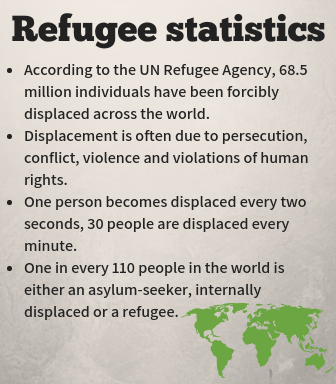“Against All Odds” hosts refugee simulation

Refugee Statistics
September 27, 2018
The Winnebago County Literacy Council and UW Oshkosh professor Michael Fonkem collaborated to host “Against All Odds,” a refugee simulation workshop, at the Oshkosh Public Library on Saturday, Sept. 22.
The simulation was created by Fonkem, who has also held the simulation for students at Oshkosh North High School and in specific classes at the
University. The simulation workshop provided members of the Oshkosh community a chance to gain an understanding of refugees and what they go through.
Literacy Council tutor Dana Koch began the workshop by giving a brief presentation on refugees, explaining who they are, what kinds of countries they are coming from and who of these refugees have come to Oshkosh.
Koch said the Literacy Council decided to do a type of refugee-awareness program because many of the students at the Literacy Council are refugees. He said there had been a lot of questions regarding where these refugees come from, what they’ve been through and what trauma they had faced.
“I learned that Dr. Fonkem had done a simulation like this at North High School, and he’s done a couple at the University, and I thought it would be a perfect collaboration,” Koch said.
Fonkem engaged the attendees in the simulation, which was specific to refugees from Syria. Attendees were asked to come up in various group sizes and were then assigned identities as Syrian refugees. (This included identities such as husband and wife, mother and children, etc.). Attendees, such as Syrian refugees, would then roll a dice to determine what happened to them next. There were a multitude of outcomes that each attendee could get, including drowning at sea, getting caught by Syrian rebels, finding a safe zone or successfully escaping to Turkey.
Fonkem set up a tarp with bubble wrap underneath to simulate the landmines in Syria. If attendees stepped on and popped any bubble wrap, it would simulate them stepping on a bomb. This could result in “injuries” or “death” among the participants. Fonkem noted the importance of the attendees not knowing where the bubble wrap was, as in Syria many people do not know where the land mines are located.
Most attendees in the simulation “died” with only four attendees remaining. None of the four made it to the United States. This showed attendees just how rarely Syrian refugees actually escape to safety.
Oshkosh West High School student Ashlyn Jones said she had the option to attend the event for a class.
“I decided to come here because it’s a topic I’m really interested in, and I just thought it would be pretty fun,” Jones said.
Jones said she was surprised by how few refugees actually make it to safety.
“I really didn’t realize how many people don’t make it to the U.S. or don’t even get to the refugee camps,” Jones said. “So many people just don’t make it.”
Fonkem discussed the “push/pull theory,” which explains there are conditions in the home countries of refugees that push them out, while there are conditions in other, more stabilized countries that pull refugees in.
“No one will leave their home if they are comfortable, or because they want to; rather, they will only leave because they have to,” Fonkem said.
Fonkem said all refugees and immigrants come with trauma and the best thing that people in a community can do to help out refugees is to simply accept them as human beings and try to be understanding of their situation.
Dr. Fonkem said he believes that it’s important for members of the Oshkosh community to be able to participate in simulations like this, especially because of the number of refugees Oshkosh has received.
“I think that if people know where [the refugees] come from and why, we are likely to be more humane to them, likely to treat them a little better,” Fonkem said.













